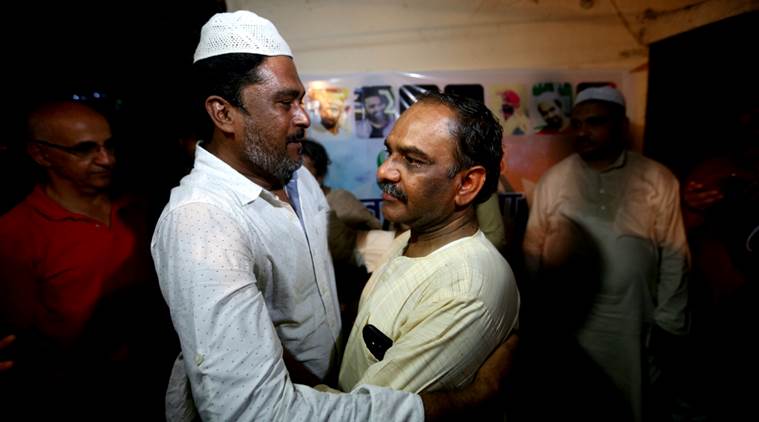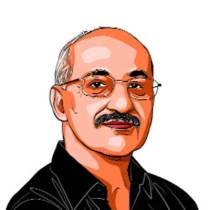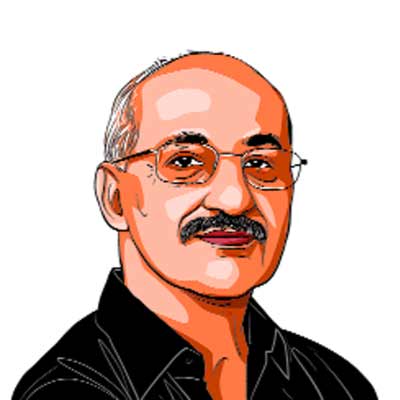Terms of forgiveness
Individuals like Mariam Khatoon, Yashpal Saxena and Imam Rashidi show the way to a more humane society

Ankit Saxena’s father (right) at the iftar he organised. (Express photo by Gajendra Yadav)
Amidst the clamour for retribution, we must listen carefully to the gentle voices that talk of forgiveness and compassion. These alone light the way to locate, deep within ourselves, our own capacities for goodness. When spoken by those who have suffered most grievously from hate, by people who have lost their loved ones to hate and violence, these words are even more evocative. They fight darkness in times when bigotry is legitimised by our leaders and communal retribution, as gruesome as the rape and bludgeoning of a child, is seen by some as permissible, even righteous.
Mariam Khatoon lost her 45 year-old husband, Alimuddin Ansari, to a lynch mob in Ramgarh, about 50 km from Jharkhand’s capital Ranchi, on June 27, 2017. A petty coal trader, he left home in his small car that summer morning to be blocked suddenly by a mob, when he was driving through the main market. A massive quantity of red meat appeared mysteriously on the road and the mob claimed that this was cow meat they had seized from Alimuddin’s car. They pulled him out, gutted his car and lynched him. They recorded a video as they beat Alimuddin to death. The laughing attackers appear in the widely-circulated video.
Only three months later, when a team of the Karwan-e-Mohabbat met Mariam at her home, she was extraordinarily composed, breaking down only once while recalling how difficult the police made it for her to get her husband’s battered body that night. “I only want justice,” she said. “I want those who lynched my husband to be punished, not for revenge, but to ensure that no one has to go through what my children and I have suffered.” A month later, a key witness was threatened, after which his wife was killed when a truck rammed the scooter she was riding pillion with Mariam’s son outside the court during the hearing. Mariam was even more frightened for the safety of her sons, but persisted with the case. Her husband’s killers were declared guilty in the first such conviction in the spate of lynchings in the name of the cow the country has witnessed.
Despite all she had endured and lost in the past one year, Mariam was clear that she did not want her husband’s killers to die. Some of the men her husband knew well, and often greeted them. “He had more Hindu friends than Muslim,” she said.
Not revenge but justice was what Mariam wanted. The sentiments were echoed by by Yashpal Saxena, a resident of a low-income West Delhi colony whose 23-year-old son was murdered by the parents of a Muslim girl he wanted to marry. Even though Delhi BJP chief Manoj Tiwari and local Bajrang Dal workers tried their utmost to communalise his son’s murder, Saxena, was resolute. “I had one son,” he said. “If I get justice, it’s good. If not, I don’t have hatred against any community”. The one-room flat above theirs belongs to a Muslim family. Saxena told us that since the tragedy that family had not walked up the stairs to their own home for a full week. They took care of them in their grief. Even three months later, they still send food to their home, he told me. “She is my sister,” Saxena said of the woman of this home. “How can I hate her? Why should I hate her?”
Imam Rashidi who lost his 16 year-old son to communal hatred in the coal city of Asansol responded in ways remarkably similar to Saxena. After mobs fought each other following hate sloganeering and display of weapons in a rally through a Muslim locality, two Hindu boys got caught in the melee in a Muslim area, and the Imam’s son in a Hindu area of the town. The Imam insisted on the Hindu boys being returned to the safety of their parents’ home unconditionally, and then waited for his son’s return. He learnt at midnight that his boy was killed. Even in his grief, his first instinct was to tell the authorities to keep the news secret, otherwise the city would burn further. He spoke to the men who gathered for the dawn namaaz the next morning: “I have lost my son. But if you cause even the slightest harm to any Hindu, by your tongue or by your hand, it will be for me an even greater tragedy”. His resolve did not break when he received his son’s brutalised body. His words restored calm to a city rocked by hate.
Twenty years after, Sabrina Lal, who fought a dogged and lonely battle for justice after her sister Jessica was killed in a restaurant, said she had no objection if the killer was released from jail. “It’s not so much about forgiveness,” she told PTI, “but it’s about letting go of a burden, something from which I have moved on. For me, it’s about taking a load off me”. She accepted that the killer’s record of charity in jail could reflect his reform.
Even Rahul Gandhi, speaking to IIM alumni in Singapore, said that after his father was killed, for long his sister and he were “very upset and hurt” and “angry” for many years. But “I have been through a lot of pain. I find it difficult to hate people, even my sister does. I remember when I saw Mr Prabhakaran on TV lying dead, I got two feelings — one was why they are humiliating this man in this way. And second was I felt really bad for him and for his kids because I understood deeply what it meant to be on the other side”.
When our leaders kindle revenge and hatred against entire communities for crimes imagined or real, it is women and men like Mariam Khatoon, Yashpal Saxena and Imam Rashidi who light our way to a humane society, one built on foundations of justice and compassion. May we walk the path they show us.
Mander is a human rights worker and writer
For all the latest Opinion News, download Indian Express App
More From Harsh Mander
- Pehlu Khan, one year laterHis family has found no justice, his community is still under siege..
- Our threatened humanityHarsh Mander: India has never been as divided since Partition, and new partitions are being constructed each day in our hearts...
- Sonia, sadlySonia Gandhi's fear that the Congress is being perceived as a Muslim party completes the community’s abandonment..








































No hay comentarios:
Publicar un comentario